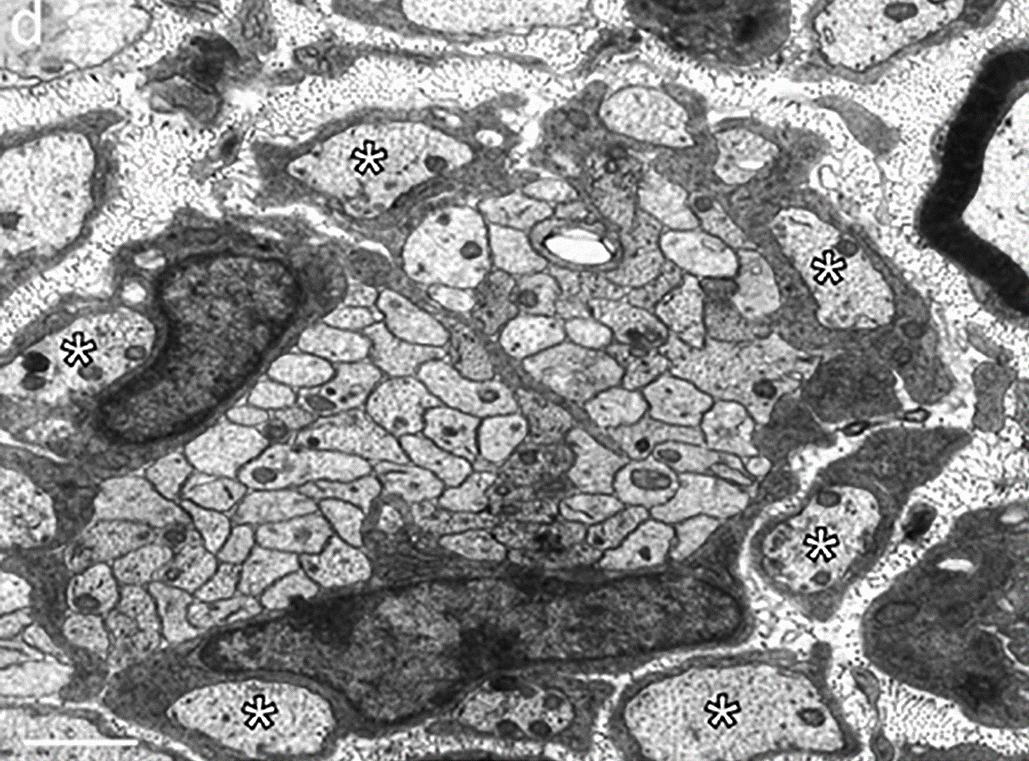Glial Cell Biology
ABOUT
How cells integrate and process information to elicit physiological responses remains one of the most challenging and pressing topics in biological research. The adaptation of cells to their environment depends on their capacity to adequately respond to internal and external cues, involving thousands of mechanical, chemical and electrical stimuli that trigger signal transduction and cytoskeletal pathways. Some of those stimuli are originated by the extracellular environment, in which proteins of the extracellular matrix (ECM) are essential components. Cell-ECM contact is largely mediated by integrins, a major group of ubiquitous cell-adhesion receptors for the proteins of the ECM, which control key downstream molecules, including the RhoGTPases that are master regulators of actin cytoskeleton dynamics. These molecules are well positioned to control the striking cellular morphological changes associated with both: myelination - the process by which axons are invested with myelin, a lipid-rich biological membrane, which forms multilamellar, spirally wrapped sheets around axons; and with the acquisition of the microglia proinflammatory phenotype.
The Glial Cell Biology (GCB) investigates how integrin and downstream RhoGTPase signaling regulate glial function in the nervous system. Particularly we have been focusing on myelinating glia, i.e., Schwann cell (SC) and oligodendrocyte (OL) development, myelination and remyelination, respectively in the peripheral and central nervous system; and on microglia function in health and disease.
RESEARCH
Over the last years, using a combination of conditional transgenic approaches in mice together with appropriate cell culture systems, omics and advanced microscopy methodologies, we have identified essential roles for integrin and RhoGTPase signaling and associated molecules, in the regulation of different stages of SC and OL development and (re)myelination. We have also found essential roles for some of those molecules in the regulation of microglia homeostasis and in the acquisition of microglia reactive phenotypes. We will also investigate whether and how these pathways are involved in glia disfunction and neuroinflammation in selected neurological disorders, including Alzheimer´s disease. Finally, on a more translational note in the context of several awarded EU project grants and prizes, we are working on the development and clinical application of ultrasensitive biosensing technologies to evaluate inflammatory risk in selected inflammatory disorders. This work under the supervision of Inês Pinto has been mainly conducted in a purpose-built lab at the Faculty of Medicine of the University of Porto to nurture interactions with more clinically orientated colleagues.

Team
Selected Publications
RhoA balances microglial reactivity and survival during neuroinflammation. Cell Death and Disease14(10):, 2023. [Journal: Article] [CI: 14] [IF: 9 (*)]
DOI: 10.1038/s41419-023-06217-w SCOPUS: 85174549599
Socodato R., Almeida T.O., Portugal C.C., Santos E.C.S., Tedim-Moreira J., Galvão-Ferreira J., Canedo T., Baptista F.I., Magalhães A., Ambrósio A.F., Brakebusch C., Rubinstein B., Moreira I.S., Summavielle T., Pinto I.M., Relvas J.B.
Microglial Rac1 is essential for experience-dependent brain plasticity and cognitive performance. Cell Reports42(12):, 2023. [Journal: Article] [CI: 14] [IF: 8,8 (*)]
DOI: 10.1016/j.celrep.2023.113447 SCOPUS: 85177068902
Melo P.N., Souza da Silveira M., Mendes Pinto I., Relvas J.B.
Morphofunctional programming of microglia requires distinct roles of type II myosins. GLIA69(11):2717-2738, 2021. [Journal: Article] [CI: 6] [IF: 8,1]
DOI: 10.1002/glia.24067 SCOPUS: 85111599976
Socodato R., Henriques J.F., Portugal C.C., Almeida T.O., Tedim-Moreira J., Alves R.L., Canedo T., Silva C., Magalhães A., Summavielle T., Relvas J.B.
Daily alcohol intake triggers aberrant synaptic pruning leading to synapse loss and anxiety-like behavior. Science Signaling13(650):, 2020. [Journal: Article] [CI: 53] [IF: 8,2]
DOI: 10.1126/scisignal.aba5754 SCOPUS: 85091580054
Socodato R., Portugal C.C., Canedo T., Rodrigues A., Almeida T.O., Henriques J.F., Vaz S.H., Magalhães J., Silva C.M., Baptista F.I., Alves R.L., Coelho-Santos V., Silva A.P., Paes-de-Carvalho R., Magalhães A., Brakebusch C., Sebastião A.M., Summavielle T., Ambrósio A.F., Relvas J.B.
Microglia Dysfunction Caused by the Loss of Rhoa Disrupts Neuronal Physiology and Leads to Neurodegeneration. Cell Reports31(12):, 2020. [Journal: Article] [CI: 65] [IF: 9,4]
DOI: 10.1016/j.celrep.2020.107796 SCOPUS: 85087074279
Seixas A.I., Morais M.R.G., Brakebusch C., Relvas J.B.
A RhoA-mediated biomechanical response in Schwann cells modulates peripheral nerve myelination. Progress in Neurobiology227:, 2023. [Journal: Article] [CI: 9] [IF: 6.7]
DOI: 10.1016/j.pneurobio.2023.102481 SCOPUS: 85163288239
Paes de Faria J., Vale-Silva R.S., Fässler R., Werner H.B., Relvas J.B.
Pinch2 regulates myelination in the mouse central nervous system. Development149(13):, 2022. [Journal: Article] [CI: 3] [IF: 4,6]
DOI: 10.1242/dev.200597 SCOPUS: 85134360715
Seixas A.I., Azevedo M.M., Paes de Faria J., Fernandes D., Mendes Pinto I., Relvas J.B.
Evolvability of the actin cytoskeleton in oligodendrocytes during central nervous system development and aging. Cellular and Molecular Life Sciences76(1):, 2019. [Journal: Review] [CI: 22] [IF: 6,5]
DOI: 10.1007/s00018-018-2915-8 SCOPUS: 85054800178
Abreu C.M., Thomas V., Knaggs P., Bunkheila A., Cruz A., Teixeira S.R., Alpuim P., Francis L.W., Gebril A., Ibrahim A., Margarit L., Gonzalez D., Freitas P.P., Conlan R.S., Mendes Pinto I.
Non-invasive molecular assessment of human embryo development and implantation potential. Biosensors and Bioelectronics157:, 2020. [Journal: Article] [CI: 17] [IF: 10,6]
DOI: 10.1016/j.bios.2020.112144 SCOPUS: 85082173325
Moreira D.C., Carvalho D.N., Santos E.C., Relvas J.B., Neves M.A.D., Mendes Pinto I.
Multi-Parametric Decision System for Analytical Performance Assessment of Electrochemical (Bio)Sensors. Advanced Materials Technologies9(13):, 2024. [Journal: Article] [CI: 1] [IF: 6.2]
DOI: 10.1002/admt.202301464 SCOPUS: 85191840170

